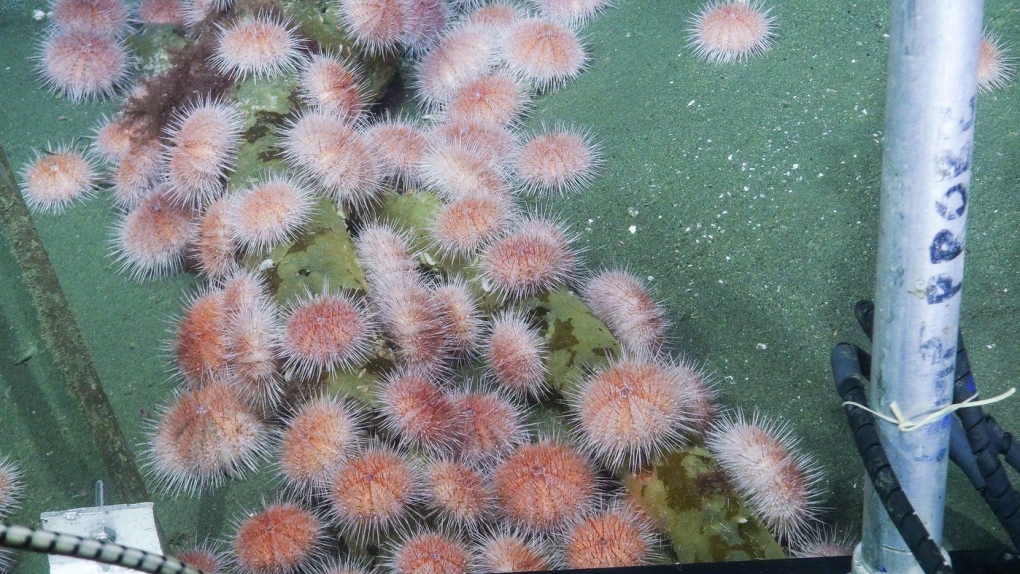B.C's pink sea urchins moving to shallower waters due to climate change
 Deepsea fragile pink sea urchin aggregating to feed on decaying seaweed at the Endeavour site during a 2016 expedition, is seen in this image provided February 7, 2023. Pink urchins like these are expanding their territory into shallower B.C. water. Researchers say the movement is a sign of how fast climate change is impacting life in the water. THE CANADIAN PRESS/HO-Ocean Networks Canada
Deepsea fragile pink sea urchin aggregating to feed on decaying seaweed at the Endeavour site during a 2016 expedition, is seen in this image provided February 7, 2023. Pink urchins like these are expanding their territory into shallower B.C. water. Researchers say the movement is a sign of how fast climate change is impacting life in the water. THE CANADIAN PRESS/HO-Ocean Networks Canada
Pink sea urchins off the coast of Vancouver Island are expanding into shallower waters, in what researchers say is an indication of how rapidly climate change is affecting ocean life.
Researchers at Memorial University, Ocean Networks Canada and the University of Victoria found the urchins, living as deep as 400 metres below, were expanding their populations into shallower water at an average rate of 3.5 metres per year as ocean warming reduces oxygen levels and food sources at lower depths.
The study's co-author, Rylan Command, said heat domes and heat waves are becoming more common, and understanding how the ocean responds to those changes can have a direct impact on people.
The movement of the pink urchins over time could, for example, upset the balance with other sea creatures, leading them to replace other species, such as red sea urchin harvested in fisheries, he said.
“It's almost like an indicator that things are changing rapidly and that matters for people, because that's going to affect us too,” he said.
Researchers looked at 14 years of data including before, during and after the marine heat wave known as “The Blob,” which persisted in the Pacific Ocean between 2013 to 2016.
They used data from both an Ocean Networks Canada observatory and the Federal Fisheries and Oceans trawl survey to collect information from about 400 metres deep, covering an area of 760-square kilometres.
“We were able to get a holistic picture of how everything is changing. I think that kind of data combination is really important and really useful,” Command said.
Study co-author Fabio De Leo, who's with Oceans Network Canada, said warming from The Blob destroyed much of the kelp the urchins eat, causing their populations to drop off dramatically.
“The kelp forests felt the marine heatwave pretty strongly. So, this essentially is one of the main food items for the pink urchin,” he said.
The researchers say the warmer-than-normal surface temperatures also disrupted the ocean process known as “upwelling,” when nutrient-rich water from lower depths cycles up to the surface, potentially affecting where the urchins find food.
The B.C. research matches similar work done in California in 2017, which found that pink urchins in that region were also seeking shallower waters.
De Leo said having data stretching over more than a decade is important for monitoring the area.
“We need to know how biodiversity and how marine communities are changing over time to adapt and to make plans,” he said.
This report by The Canadian Press was first published Feb. 7, 2023.
CTVNews.ca Top Stories

B.C. tenants evicted for landlord's use after refusing large rent increase to take over neighbouring suite
Ashley Dickey and her mother rented part of the same Coquitlam duplex in three different decades under three different landlords.
Mountain guide dies after falling into a crevasse in Banff National Park
A man who fell into a crevasse while leading a backcountry ski group deep in the Canadian Rockies has died.
Expert warns of food consumption habits amid rising prices
A new survey by Dalhousie University's Agri-Food Analytics Lab asked Canadians about their food consumption habits amid rising prices.
MPP Sarah Jama asked to leave Ontario legislature for wearing keffiyeh
MPP Sarah Jama was asked to leave the Legislative Assembly of Ontario by House Speaker Ted Arnott on Thursday for wearing a keffiyeh, a garment which has been banned at Queen’s Park.
Charlie Woods, son of Tiger, shoots 81 in U.S. Open qualifier
Charlie Woods failed to advance in a U.S. Open local qualifying event Thursday, shooting a 9-over 81 at Legacy Golf & Tennis Club.
Ex-tabloid publisher testifies he scooped up possibly damaging tales to shield his old friend Trump
As Donald Trump was running for president in 2016, his old friend at the National Enquirer was scooping up potentially damaging stories about the candidate and paying out tens of thousands of dollars to keep them from the public eye.
Here's why provinces aren't following Saskatchewan's lead on the carbon tax home heating fight
After Prime Minister Justin Trudeau said the federal government would still send Canada Carbon Rebate cheques to Saskatchewan residents, despite Saskatchewan Premier Scott Moe's decision to stop collecting the carbon tax on natural gas or home heating, questions were raised about whether other provinces would follow suit. CTV News reached out across the country and here's what we found out.
Montreal actress calls Weinstein ruling 'discouraging' but not surprising
A Montreal actress, who has previously detailed incidents she had with disgraced Hollywood producer Harvey Weinstein, says a New York Court of Appeals decision overturning his 2020 rape conviction is 'discouraging' but not surprising.
Caleb Williams, Jayden Daniels and Drake Maye make it four NFL drafts with quarterbacks going 1-3
Caleb Williams is heading to the Windy City, aiming to become the franchise quarterback Chicago has sought for decades.































